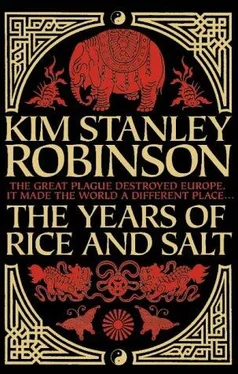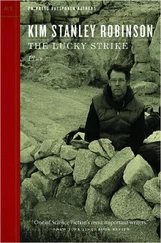Kim Robinson - The Years of Rice and Salt
Здесь есть возможность читать онлайн «Kim Robinson - The Years of Rice and Salt» весь текст электронной книги совершенно бесплатно (целиком полную версию без сокращений). В некоторых случаях можно слушать аудио, скачать через торрент в формате fb2 и присутствует краткое содержание. Год выпуска: 2003, ISBN: 2003, Издательство: Bantam Books, Жанр: Альтернативная история, на английском языке. Описание произведения, (предисловие) а так же отзывы посетителей доступны на портале библиотеки ЛибКат.
- Название:The Years of Rice and Salt
- Автор:
- Издательство:Bantam Books
- Жанр:
- Год:2003
- ISBN:0-553-10920-0
- Рейтинг книги:5 / 5. Голосов: 1
-
Избранное:Добавить в избранное
- Отзывы:
-
Ваша оценка:
- 100
- 1
- 2
- 3
- 4
- 5
The Years of Rice and Salt: краткое содержание, описание и аннотация
Предлагаем к чтению аннотацию, описание, краткое содержание или предисловие (зависит от того, что написал сам автор книги «The Years of Rice and Salt»). Если вы не нашли необходимую информацию о книге — напишите в комментариях, мы постараемся отыскать её.
The Years of Rice and Salt — читать онлайн бесплатно полную книгу (весь текст) целиком
Ниже представлен текст книги, разбитый по страницам. Система сохранения места последней прочитанной страницы, позволяет с удобством читать онлайн бесплатно книгу «The Years of Rice and Salt», без необходимости каждый раз заново искать на чём Вы остановились. Поставьте закладку, и сможете в любой момент перейти на страницу, на которой закончили чтение.
Интервал:
Закладка:
As they sailed into Mombasa, the grandest harbor yet, they came on a fleet of giant ships, ships bigger than Bold had imagined possible. Each one was as big as a small town, with a long line of masts down its center. There were about ten of these gigantic outlandish ships, with another twenty smaller ones anchored among them. “Ah good,” said Zeyk to the zambuco’s captain and owner. “The Chinese are here.”
The Chinese! Bold had had no idea they owned such a great fleet as this one. It made sense, though. Their pagodas, their great wall; they liked to build big.
The fleet was like an archipelago. All on board the zambuco looked at the great ships, abashed and apprehensive, as if faced with seagoing gods. The large Chinese ships were as long as a dozen of the biggest dhows, and Bold counted nine masts on one of them. Zeyk saw him and nodded. “Look well. Those will soon be your home, God willing.”
The zambuco’s master brought them inshore on a breath of a breeze. The town’s waterfront was entirely occupied by the landing boats of the visitors, and after some discussion with Zeyk, the zambuco’s owner beached his craft just south of the waterfront. Zeyk and his man rolled up their robes and stepped over the freeboard into the water, and helped the whole string of slaves over the side onto land. The green water was as warm as blood, or even hotter.
Bold spotted some Chinese, wearing their characteristic red felt coats even here, where they were certainly much too warm. They wandered the market, fingering the goods on display and chattering among themselves, trading with the aid of a translator Zeyk knew. Zeyk approached and greeted him effusively, asked about direct trade with the Chinese visitors. The translator introduced him to some of the Chinese, who seemed polite, even affable, in their usual way. Bold found himself trembling slightly, perhaps from heat and hunger, perhaps from the sight of the Chinese, after all these years, on the other side of the world. Still pursuing their business.
Zeyk and his assistant led the slaves through the market. It was a riot of smell, color, and sound. People as black as pitch, their eyeballs and teeth flashing white or yellow against their skin, offered goods and bartered happily. Bold followed the others past.
Great mounds of green and yellow fruit,
Rice, coffee, dried fish and squid,
Lengths and bolts of colored cotton cloth,
Some spotted, others striped white and blue;
Bales of Chinese silk, piles of Mecca carpets;
Huge brown nuts, copper pans
Filled with colored beads or gemstones,
Or round balls of sweet-smelling opium;
Pearls, raw copper, carnelian, quicksilver;
Daggers and swords, turbans, shawls;
Elephant tusks, rhinoceros horns,
Yellow sandalwood, ambergris,
Ingots and coin-strings of gold and silver,
White cloth, red cloth, porcelain,
All the things of this world, solid in the sun.
And then the slave market, again in a square of its own, next to the main market, with a central auction block, so much like a lama’s dais when empty.
The locals were gathered around a sale to one side, not a full auction. They were mostly Arabs here, and often dressed in blue cloth robes and red leather shoes. Behind the market a mosque and minaret stood before rows of four- and even five-story buildings. The clamor was great, but surveying the scene, Zeyk shook his head. “We’ll wait for a private audience,” he said.
He fed the slaves barley cakes and led them to one of the big buildings next to the mosque. There some Chinese arrived with their translator, and they all went inside to an inner courtyard of the building, shaded and full of green broad-leaved plants and a burbling fountain. A room opening onto this courtyard had shelves on all its walls, with bowls and figures placed on them in an elaborate, beautiful display: Bold recognized pottery from Samarqand, and painted figurines from Persia, among Chinese white porcelain bowls painted in blue, gold leaf, and copper.
“Very elegant,” Zeyk said.
Then they were to business. The Chinese officers inspected Zeyk’s string of slaves. They spoke to the translator, and Zeyk conferred in private with the man, nodding frequently. Bold found he was sweating, though he felt cold. They were being sold to the Chinese as a single lot.
One of the Chinese strolled down the line of slaves. He looked Bold over.
“How did you get here?” he asked Bold in Chinese.
Bold gulped, waved north. “I was a trader.” His Chinese was really rusty. “The Golden Horde took me and brought me to Anatolia. Then to Alexandria, then here.”
The Chinese nodded, then moved on. Soon after the slaves were led off by Chinese sailors in trousers and short shirts, back to the waterfront. There several other strings and groups of slaves were gathered. They were stripped, washed down with fresh water, an astringent, more fresh water. They were given new robes of plain cotton, led to boats, and rowed out to the huge side of one of the great ships. Bold climbed a ladder forty-one steps up the wooden wall of the ship’s side, following a skinny black slave boy. They were taken together below the main deck, to a room near the rear of the ship. What happened in there we don’t want to tell you, but the story won’t make sense unless we do, so on to the next chapter. These things happened.
4
The ship was so big it did not rock on the waves. It was like being on an is land. The room they were kept in was low and broad, extending the width of the ship. Gratings on both sides let in air and some light, though it was dim. A hole under one grating overhung the ship’s side and served as the place of relief.
The skinny black boy looked down it as if judging whether he could escape through the hole. He spoke Arabic better than Bold, though it was not his native tongue either; he had a guttural accent that Bold had never heard before. “They trot you like derg.” He came from the hills behind the sahil, he said, staring down the hole. He stuck one foot through, then another. He wasn’t going to get through.
Then the doorlock rattled and he pulled his feet out and sprang away like an animal. Three men came in and had them all stand before them. Ship’s petty officers, Bold judged. Checking the cargo. One of them inspected the black boy closely. He nodded to the others, and they put wooden bowls of rice on the floor, and a big bamboo tube bucket of water, and left.
That was the routine for two days. The black boy, whose name was Kyu, spent much of his time looking down the shithole, at the water it seemed, or at nothing. On the third day they were led up and out to help load the ship’s cargo. It was hauled aboard on ropes running through pulleys on the masts, then guided down hatches into holds below. The loaders followed instructions from the officer of the watch, usually a big moon-faced Han. Bold learned that the hold was broken by interior walls into nine individual compartments, each several times bigger than the biggest Red Sea dhows. The slaves who had been on ships before said that would make the great ship impossible to sink; if one compartment leaked it could be emptied and repaired, or even left to flood, but the others would keep the ship afloat. It was like being on nine ships tied together.
One morning the deck overhead reverberated with the drumming of sailors’ feet, and they could feel the two giant stone anchors being raised. Big sails were hauled up on crossbeams, one for each mast. The ship began a slow stately rocking over the water, heeling slightly.
It was indeed a floating town. Hundreds lived on it; moving bags and boxes from hold to hold, Bold counted five hundred different people, and there were no doubt many more. It was astonishing how many people were aboard. Very Chinese, the slaves all agreed. The Chinese didn’t notice it was crowded, to them it was normal, no different from any other Chinese town.
Читать дальшеИнтервал:
Закладка:
Похожие книги на «The Years of Rice and Salt»
Представляем Вашему вниманию похожие книги на «The Years of Rice and Salt» списком для выбора. Мы отобрали схожую по названию и смыслу литературу в надежде предоставить читателям больше вариантов отыскать новые, интересные, ещё непрочитанные произведения.
Обсуждение, отзывы о книге «The Years of Rice and Salt» и просто собственные мнения читателей. Оставьте ваши комментарии, напишите, что Вы думаете о произведении, его смысле или главных героях. Укажите что конкретно понравилось, а что нет, и почему Вы так считаете.












